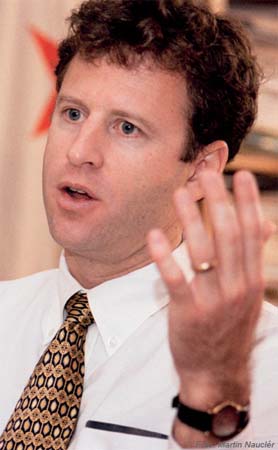
The buildup in Afghanistan will, in the end, take a year - far longer than it took us to put all surge forces in place in Iraq. And even counting NATO forces, it will provide us only about half the numbers that the foreign coalition had in Iraq. Given this slow pace, we have to be patient in expecting results. This year will be bloody and will probably not lead to much measurable progress, if any. Fortunately, violence levels in Afghanistan, while worse than before, are not nearly as bad today as they were in Iraq from 2004 to 2007 (in fact, they resemble those of South Africa or Mexico or Colombia or Russia today). Also, while many Americans and Afghans have soured on President Hamid Karzai, he has appointed some good Cabinet officials, starting with Minister of Interior Muhammad Hanif Atmar and Minister of Defense Abdul Rahim Wardak. These two capable men are in charge of security force reform, perhaps the most crucial task in the country. On balance - with our expectations modest, our troops better than ever at this sort of operation, some good Afghans in place to work with us and serious resources devoted to the effort - the odds are good that we will succeed in Afghanistan. We have about a two-thirds chance. But given the alternatives, that's a gamble worth running. Michael O'Hanlon, a Senior Fellow at the Brookings Institute and a Visiting Lecturer at Princeton University, served as a Peace Corps Volunteer in Congo Kinshasa.
Michael O'Hanlon writes: Can Obama win in Afghanistan?
Can Obama win in Afghanistan?
By MICHAEL O'HANLON | 3/20/09 4:57 AM EDT
By 2010, the Afghanistan conflict will have become the longest war in American history. Is it a quagmire that we should extricate ourselves from while there is still time? Should the buildup in U.S. forces now under way even be tried?
The answer to the last question is yes. Leave aside the domestic politics. The strategic stakes are high, given that this part of the world has become Al Qaeda central (and that nuclear-armed Pakistan is directly involved). In addition, the prospects for success - or at least partial success, permitting a reasonably stable country, free of major terrorist sanctuaries - are pretty good.
But Afghanistan could become a quagmire. It is unlikely but possible. So even as we intensify the effort, we need realistic expectations about how long the effort will take - and how to know if it is failing. President Barack Obama should approve the full buildup his commanders are requesting, even as he also steels the nation for a difficult and uncertain mission ahead.
Why Obama's new strategy makes sense
Obama is completing a review process that is likely, in the end, to approve roughly doubling U.S. combat forces in Afghanistan to about 65,000 from 30,000 or so. The total NATO-led international force will then approach 100,000 total troops; the overall coalition will also include 150,000 Afghans in uniform (about a quarter of whom are presently in respectable military shape).
To some critics, this buildup looks like pouring additional resources into a black hole deep in the heart of the mountains of Central Asia, with no particular sense of what they will do or why they will be helpful. In fact, some critics argue that the buildup will make matters worse - not only for our troops, who will likely die in larger numbers than before, but for the prospects of the mission, since a buildup will further antagonize the famously xenophobic Afghan people and further motivate the Taliban as well as other extremists.
Admittedly, there are risks to the buildup. But what Afghans resent most is foreigners who want to colonize their country (e.g., the British in the 19th century) and foreigners who come in and make life worse for them (e.g., the Soviets in the 1980s). Polls and private conversations suggest they are agnostic about foreigners who want to stay just long enough to help them establish a viable state, viable military and police institutions and a stronger economy - and then leave. Anti-Americanism is indeed worsening in Afghanistan today, and it is a real problem. But it is far less severe than Afghans' hatred of the Taliban. Every poll I've ever seen puts the Taliban's popularity ratings in the single-digit range.
The buildup of U.S. forces is designed to do four main things. First, together with allies, it will help us provide basic population security in the country's south and east. True, troop numbers will remain inadequate even after the reinforcements have arrived. But we can concentrate our efforts in those parts of the country that are nearest Pakistan and most violent. Second, working with Afghans and NATO allies, the buildup will help us protect roads - a step that is needed in order to convey a sense of normalcy in the country and to help farmers get crops besides opium to market. (Also, over time, having more eyes on roads should complicate the ability of insurgents to plant improvised explosive devices, or IEDs, when we aren't watching - and IEDs are the main threat to our troops in Afghanistan today.) Third, we will vigorously train Afghan soldiers, police and border police for the first time - including embedding advisers with units as they deploy in the field, even after basic training is complete. Until now, we have had only half the trainers we need, at best. Fourth, we will try to interdict some movements of Taliban and other insurgent groups across the Afghanistan-Pakistan border.
Why it might not work
Even with the solid logic of this new strategy, even with a U.S. military that has become very good at counterinsurgency leading the way, this strategy could fail.
Even with the new forces, we still won't really have enough troops to properly protect the Afghan population. (Among other things, the Afghan police and Army need to grow much more, at least doubling in overall size.) We certainly won't have enough capability to seal the border with Pakistan. The drug trade could prove too endemic, and corruption too prevalent, to permit reform.
The need for resolve - and for patience
And even if it works, the pace of our buildup will be slow, meaning that results will be slow to appear. I would predict that Obama will soon approve another 15,000 U.S. troops for Afghanistan, making for a grand total of about 65,000, as noted above. (He has approved an additional 17,000 to date, meaning that we will have about 50,000 soldiers and Marines on the ground by sometime this summer or so.) There is no point in his delaying this decision, because it makes him look tentative and at odds with his commanders. Since he's already building up forces, there's little point in trying to stay half-pregnant.
But even if I am right, the buildup in Afghanistan will, in the end, take a year - far longer than it took us to put all surge forces in place in Iraq. And even counting NATO forces, it will provide us only about half the numbers that the foreign coalition had in Iraq. Given this slow pace, we have to be patient in expecting results. This year will be bloody and will probably not lead to much measurable progress, if any.
Fortunately, violence levels in Afghanistan, while worse than before, are not nearly as bad today as they were in Iraq from 2004 to 2007 (in fact, they resemble those of South Africa or Mexico or Colombia or Russia today). Also, while many Americans and Afghans have soured on President Hamid Karzai, he has appointed some good Cabinet officials, starting with Minister of Interior Muhammad Hanif Atmar and Minister of Defense Abdul Rahim Wardak. These two capable men are in charge of security force reform, perhaps the most crucial task in the country.
On balance - with our expectations modest, our troops better than ever at this sort of operation, some good Afghans in place to work with us and serious resources devoted to the effort - the odds are good that we will succeed in Afghanistan. We have about a two-thirds chance. But given the alternatives, that's a gamble worth running.
Michael O'Hanlon is a senior fellow in foreign policy studies at the Brookings Institution.












